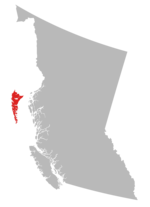|
Council of the Haida Nation
The Council of the Haida Nation (CHN; Haida: X̱aaydaG̱a Waadlux̱an Naay) is the elected government of the Haida Nation, the Indigenous occupants of the Haida Gwaii archipelago in the Canadian province of British Columbia. The council consists of a president and vice-president elected by popular vote, twelve regional representatives from four electoral regions, and one appointed representative from each of the Old Massett Village Council and Skidegate Band Council.[3] The CHN was formed in 1974, with the goal of organizing the Haida nation to seek recognition of Aboriginal title throughout Haida Gwaii.[4] In April 2024, after 20 years of negotiations, the CHN and British Columbia signed the Rising Tides Agreement, which recognized Haida Aboriginal title throughout the entirety of Haida Gwaii, which will see the transfer of all Crown land to the Haida Nation.[5][6] There are two main Haida villages on Haida Gwaii: Old Massett (Haida: G̱aw) and Skidegate (Haida: Hlg̱aagilda). Haida populations in Prince Rupert (Haida: Kxeen) and Vancouver (Haida: T'agwan) are also represented in the CHN. The CHN recognizes the separate jurisdiction of the Kaigani Haida, in southern Alaska, who are members of the Haida Nation, but are governed by the Central Council of the Tlingit and Haida Indian Tribes of Alaska. MandateThe Mandate is an order for the Council of the Haida Nation. The Council follows the Mandate to the best of their abilities. The Mandate acknowledges the following :
LanguagesThe constitution acknowledges the Haida language (X̱aad Kil and X̱aayda Kil) and English as the official languages of the Haida Nation.[3] GovernanceThe House of Assembly is a legal form of Haida National government. This group has the right to pass laws which align with the Constitution of the Haida Nation. The House of Assembly meets yearly with the Council of the Haida Nation. These meetings occur in October during the third week of the month. Each yearly meeting alternates between G̱aaw (Old Masset) and Hlg̱aagilda (Skidegate). In addition to the House of Assembly meetings, the Council of the Haida Nation meet quarterly with Haida citizens.[8] The Vice President calls the House of Assembly meeting twenty days before the meeting date. They may also call other meeting dates if required, again, at least twenty days before the scheduled date. All motions placed through the House of Assembly can only be approved by a vote of three-quarter approval or more.[8] SecretariatThe Council of the Haida Nation sustains a Secretariat. The duties of the Secretariat are as follows: the Secretariat answers to both the House of Assembly and the Council of the Haida Nation, the Secretariat acts as Treasurer and will manage the staff of the Council of the Haida Nation, and the Secretariat has multiple rights to the credit of the Council of the Haida Nation.[8] Subsidiary bodies (Village Councils)The Village Councils are concerned with the well-being of the communities and Band members. The Village Councils may initiate laws.[9] Skidegate Band CouncilChief Councillor: Billy Yovanovich[9] Councillors: Duane Alsop, Lyndale George, David Crosby, Michelle McDonald, Trent Moraes, Michelle Pineault, Robert Russ.[10] Old Masset Village CouncilChief Councillor: Donald (Duffy) Edgars Councillors: Brodie Swanson (Deputy), Lisa White, Cecil Brown, Ashley Jacobson, Robert Brown, Brodie Swanson, Benjamin Edgars[9] CitizenshipThe Haida citizenship act was approved on 31 May 2017. When accepted as a Haida Nation citizen, one receives both a Card and a Certificate. The card is used for identification purposes, and the certificate is the official citizenship document.[11] The Constitution of the Haida Nation states that the title of Haida Gwaii Citizen may be given to an individual who does not have Haida ancestry. This title does not include receiving Haida indigenous rights or Haida heritage claims.[3] References
External links |
||||||||||||||||||||||||||||||||||||||||||||||||||||||||||

